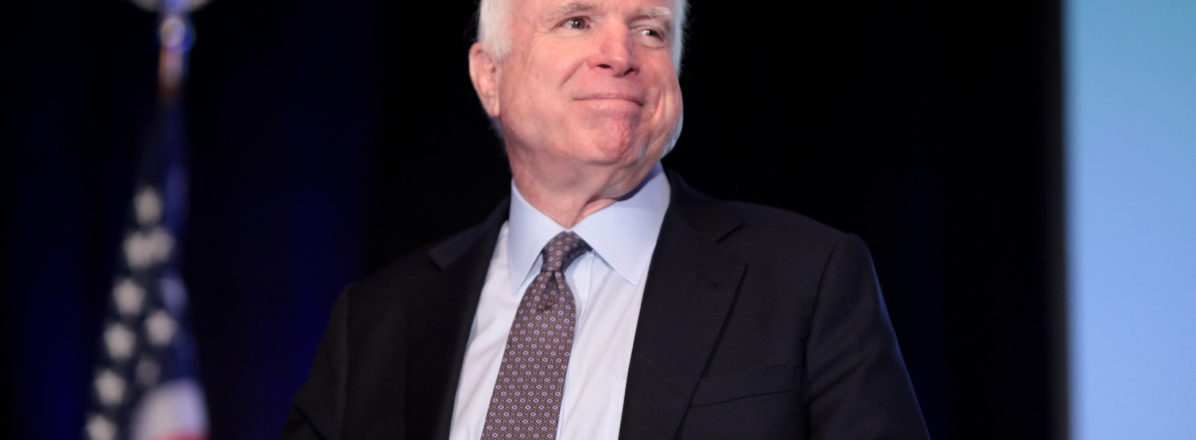A nation must think before it acts.
When I was preparing to moderate a discussion with Senator John McCain, his staff members were firm. “Senator is going to be tired after a long trip and a dozen of meetings; you should end in 45 minutes.” I took out my watch and was ready to conform.
With more than one hundred people watching, the time was flying. I soon had to tell the audience that there was time for only one more question. Senator McCain then looked at me and modestly whispered: “Can we stay a bit longer?” Who am I to say no to a war hero? The event took another 45 minutes, as McCain’s staff helplessly watched him giving autographs and taking selfies with the audience.
The discussion took place in Vilnius, Lithuania, just after Christmas in 2016. Donald Trump was president-elect, and along with the rest of the world, the Baltic states were anxious about the future of American foreign policy. McCain’s mission was to reassure: he talked about NATO, unwavering U.S. commitment to its allies, and the bright future for freedom loving democracies. McCain was a frequent traveler to the region, so many things were a repetition of his previous speeches; but how important it was to hear that again.
It was not only symbolic. Soon after, McCain, Chairman of the Senate Armed Service Committee, returned to Washington, D.C. to chair a hearing with Trump’s proposed Defense Secretary, James Mattis. McCain got straight to the point and asked whether Mattis was supportive of stationing American troops in the Baltics permanently. “They are our allies, and they are worried,” he said. Mattis’ response was diplomatic, yet unconvincing. McCain repeated: “I am talking specifically about the Baltic states.” Mattis nodded his acknowledgement, “Yes, sir,” he replied.
McCain was always regarded as the best friend of the Baltics in the highest levels of American politics. He had a deep knowledge of the region, a deep understanding of Russian foreign policy, and a deep feeling of the importance of the United States to its allies. At the end of the Cold War, he was an ardent supporter of recognition of the Baltic states’ independence. Soon after, he was an advocate of NATO’s enlargement—even at the time when there were reasonable doubts whether the Alliance could ensure the security of Russia-neighboring countries. History proved McCain right; the Baltics, which are a part of NATO, are rapidly growing democracies producing tech successes to boot; Ukraine, which decided to stay neutral, is currently fighting a bloody stalemate with Russian-backed separatists.
McCain’s passing marks a shift in Republicans’ priorities and the perception of Russia. While McCain was always bluntly calling Russia dangerous, President Trump says that Putin is “fine.” Recent opinion polls reveal the percentage of Republicans calling Russia a friend or ally is up sharply since 2014, from 22% to 40%. This increase has occurred despite Crimea’s annexation and overwhelming evidence of Russia’s meddling in the U.S. elections.
Many of those leaders who still remember the lessons of the Cold War and the process of democratization of Eastern Europe—the history we lived—have retired or are on a verge of it. As former Secretary of Defense Robert Gates once said, “The future U.S. political leaders—those for whom the Cold War was not the formative experience that it was for me—may not consider the return on America’s investment in NATO worth the cost.” Moreover, China and others topics are also gaining prominence in academia, while decreased government funding for Russia-related research and graduate training is becoming “a very serious issue.” McCain was extremely consistent in his interest on this part of the world, but it is going to be more and more difficult to develop necessary knowledge and to encourage future leaders to follow such a path.
McCain once said that we should not hide the truth about ourselves, from ourselves. It’s tough wisdom like that which makes McCain’s passing truly the end of an era. More than that, it is a loss of inspiration for those—including me—who saw McCain as an example of a political leader with clear principles. “Young people like you make my work meaningful, so I was in no rush to leave,” he told me. Sadly, with McCain’s passing, I can’t imagine a similarly important and powerful evening for my country any time soon. And I know there are others like me, advocates of democracy who always had a friend in Washington, mourning that same loss.




